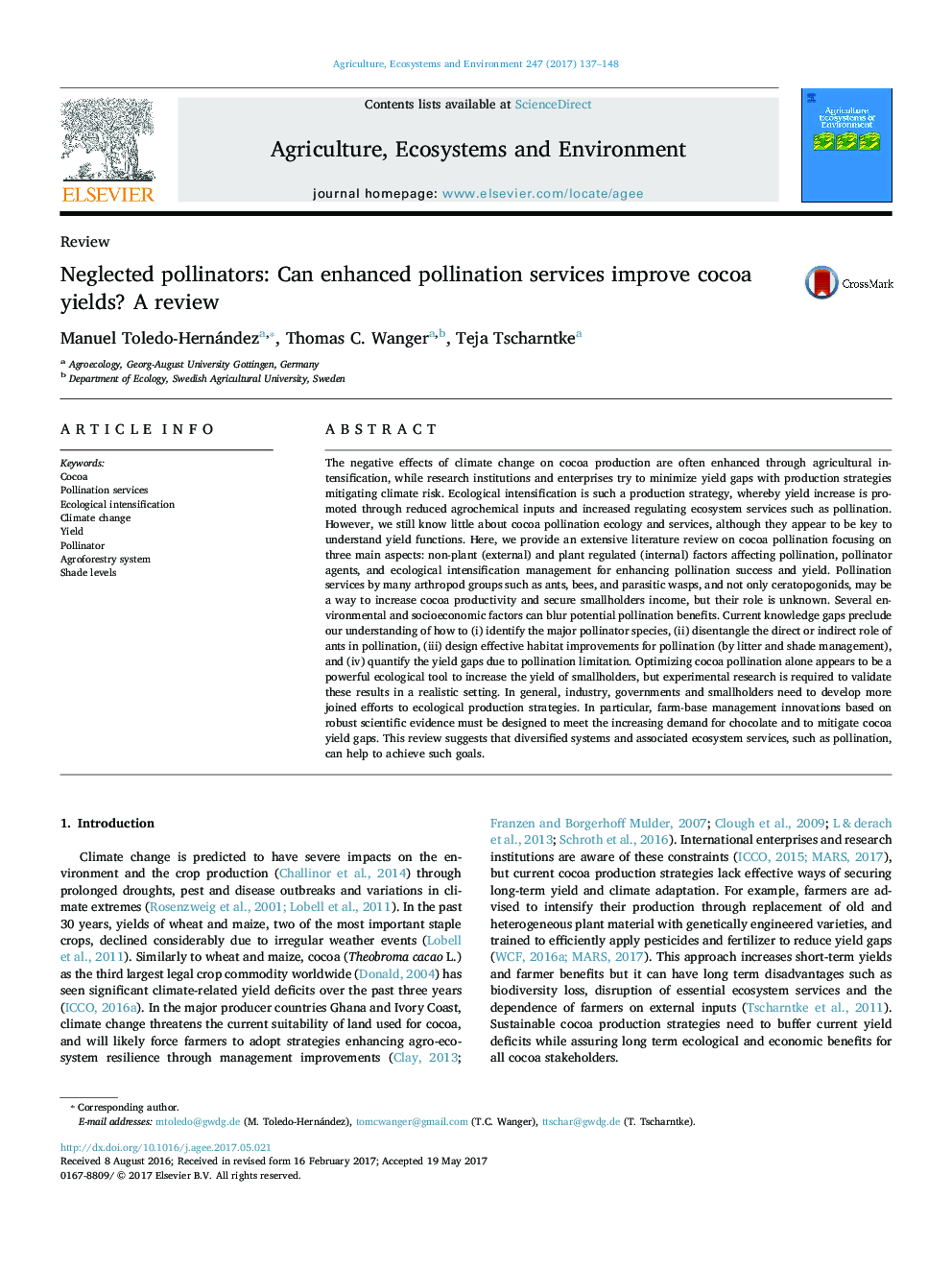| کد مقاله | کد نشریه | سال انتشار | مقاله انگلیسی | نسخه تمام متن |
|---|---|---|---|---|
| 5537986 | 1552005 | 2017 | 12 صفحه PDF | دانلود رایگان |
عنوان انگلیسی مقاله ISI
Neglected pollinators: Can enhanced pollination services improve cocoa yields? A review
ترجمه فارسی عنوان
گرده افشانی های نادیده گرفته شده: آیا خدمات گرده افشانی پیشرفته می تواند باعث بهبود عملکرد کاکائو شود؟ بازنگری
دانلود مقاله + سفارش ترجمه
دانلود مقاله ISI انگلیسی
رایگان برای ایرانیان
کلمات کلیدی
کاکائو، خدمات گرده افشانی، تشدید زیست محیطی، تغییر آب و هوا، بازده، گرده افشانی، سیستم آبیاری جنگلی، سطوح سایه،
موضوعات مرتبط
علوم زیستی و بیوفناوری
علوم کشاورزی و بیولوژیک
علوم زراعت و اصلاح نباتات
چکیده انگلیسی
The negative effects of climate change on cocoa production are often enhanced through agricultural intensification, while research institutions and enterprises try to minimize yield gaps with production strategies mitigating climate risk. Ecological intensification is such a production strategy, whereby yield increase is promoted through reduced agrochemical inputs and increased regulating ecosystem services such as pollination. However, we still know little about cocoa pollination ecology and services, although they appear to be key to understand yield functions. Here, we provide an extensive literature review on cocoa pollination focusing on three main aspects: non-plant (external) and plant regulated (internal) factors affecting pollination, pollinator agents, and ecological intensification management for enhancing pollination success and yield. Pollination services by many arthropod groups such as ants, bees, and parasitic wasps, and not only ceratopogonids, may be a way to increase cocoa productivity and secure smallholders income, but their role is unknown. Several environmental and socioeconomic factors can blur potential pollination benefits. Current knowledge gaps preclude our understanding of how to (i) identify the major pollinator species, (ii) disentangle the direct or indirect role of ants in pollination, (iii) design effective habitat improvements for pollination (by litter and shade management), and (iv) quantify the yield gaps due to pollination limitation. Optimizing cocoa pollination alone appears to be a powerful ecological tool to increase the yield of smallholders, but experimental research is required to validate these results in a realistic setting. In general, industry, governments and smallholders need to develop more joined efforts to ecological production strategies. In particular, farm-base management innovations based on robust scientific evidence must be designed to meet the increasing demand for chocolate and to mitigate cocoa yield gaps. This review suggests that diversified systems and associated ecosystem services, such as pollination, can help to achieve such goals.
ناشر
Database: Elsevier - ScienceDirect (ساینس دایرکت)
Journal: Agriculture, Ecosystems & Environment - Volume 247, 1 September 2017, Pages 137-148
Journal: Agriculture, Ecosystems & Environment - Volume 247, 1 September 2017, Pages 137-148
نویسندگان
Manuel Toledo-Hernández, Thomas C. Wanger, Teja Tscharntke,
